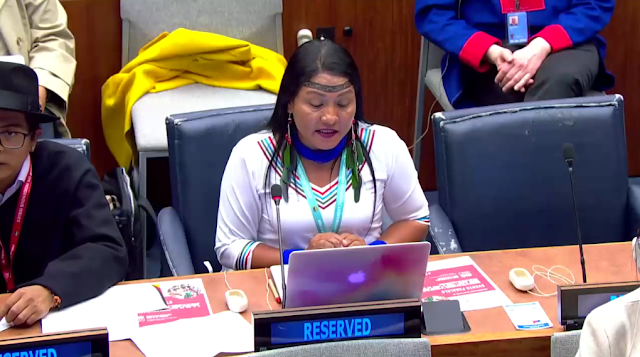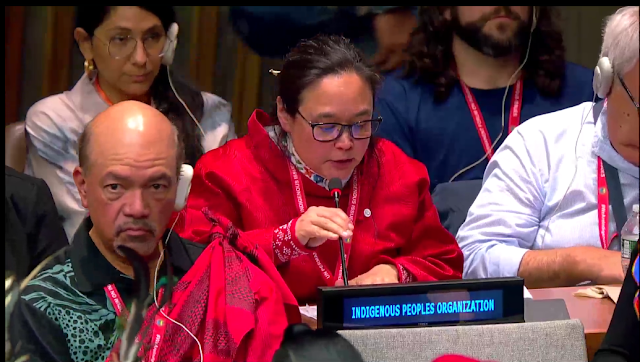.
 |
| Global Indigenous Youth Caucus at UN Permanent Forum on Indigenous Issues today. |
Oglala Lakota Youth and the Global Indigenous Youth Caucus Lead at United Nations
By Brenda Norrell, Censored News, April 15, 2024
NEW YORK -- "We are witnessing the genocide and displacement of Palestinian people. We demand the right of return to their ancestral homeland," the Global Indigenous Youth Caucus told the UN Permanent Forum on Indigenous Issues as it opened its session on Monday.
Representing the seven regions of the world, the youths expressed gratitude to their elders for their defense of ancestral homelands, and recognized the role of forced removal of Indigenous children from their families, in disregard for United Nations Declaration on the Rights of Indigenous Peoples.
Mining interests and government policies threaten Indigenous with displacement, loss of life, the denial of burial and ceremonial rights and the disruption of generational knowledge transfer. The youths pointed out the lack of education that is based on an Indigenous perspective that results in ignorance, and said Treaties need to be recognized as vital in climate change adaptation plans and the legal framework.
Pointing out the global crisis of the genocide in Palestine, the youths called for an expert working group that connects the forced removal and ethnic cleansing of Indigenous youths and people from their ancestral homelands to the worsening climate crisis. Their statement brought a roar of applause at the United Nations in New York today.
 |
| Vice President of CONAIE Ecuador |
In Ecuador, Canada's Mining Means More Violence
"It is unacceptable for the state to use charges such as 'terrorism' to silence dissenting voices and to criminalize legitimate resistance," Zenaida Yasacama, Vice President of CONAIE Ecuador told the U.N. today.
CONAIE said mining and energy transition is a crucial issue and affects Indigenous Peoples in Ecuador's right to self-determination. Corporations are using the term 'energy transition' which cannot be used to further the violence which has already resulted from mining.
In recent months in Ecuador, there has been growing violence due to copper mining, in southern Ecuador, where Canadian companies are copper mining. Copper is considered a 'critical mineral.' Energy transition can not be used to justify pillaging and violence, CONAIE told the U.N.
Currently, talks are underway for a free trade agreement between Ecuador and Canada, but this cannot be done at the expense of Indigenous Peoples, CONAIE said.
Indigenous are being criminalized with the punishment that prevents them from speaking on self-determination.
"Canadian mining companies must be held responsible for their actions," said CONAIE, the Confederation of Indigenous Nationalities of Ecuador.
 |
| Inuit Circumpolar Council |
The Inuit Circumpolar Council told the U.N. today that Inuit are the original inhabitants a vast region which is rich in biodiversity. Inuit are working to ensure Inuit rights of living on the land with the resources. Inuit spoke on the importance of receiving the U.N. Equator Prize.
ICC said in a statement, "The Inuit Circumpolar Council (ICC) is a non-governmental organization that unites 180,000 Inuit Indigenous people across Nunaat, the Inuit homeland that spans Canada, Greenland, Russia, and the State of Alaska in the United States. ICC integrates ancestral Inuit knowledge and practices to protect the Arctic ecosystem and defend land and ocean rights."
Currently, ICC is establishing an Inuit-managed protected area in the Pikialasorsuaq, a shared region between Canada and Greenland. The ICC initiated the Pikialasorsuaq Commission.
"Through community consultation with youth, elders, men, and women, this groundbreaking initiative aims to preserve the ecological integrity of Pikialasorsuaq, the largest Arctic polynya. It also seeks to enable unrestricted movement between historically connected communities. This marks the first international Inuit-led body managing an Inuit Protected Area, setting a unique precedent for conservation and Indigenous rights."
The Criminalization of Indigenous Peoples and their Rights |
Criminalization of Indigenous Peoples Rights
Indigenous Peoples are victims of mining and pipelines, and energy projects around the world, including 'clean energy' projects which do not take into consideration the human rights of Indigenous Peoples, Naw Ei Ei Min, member of Myanmar's Indigenous Karen people, told the UN Permanent Forum on Indigenous Issues as it opened its session on Monday.
Indigenous Peoples are imprisoned for maintaining their rights to their land, in opposition to mining or pipelines. Indigenous leaders are targeted to suppress the entire community. The report points out that Indigenous languages are threatened. Further, the report states that banks and private sectors should not be allowed to support this criminalization. Read the written report:
https://social.desa.un.org/sites/default/files/n2403079%20EN.pdf
Australia's Incarceration of Aboriginal Youths: Cruel and Inhumane
"Unliveable, disgusting and inhumane," those are the conditions that children endure in Australia's prisons. The policy of taking Aboriginal children from their families continues with the cruel and inhumane treatment of Aboriginal children in prisons, Hannah McGlade told the U.N. today.
"Their lives are precious, their lives matter," McGlade said. The removal of Aboriginal children from their families, high rates of child incarceration, and extensive hours in solidarity confinement, are among the reasons that Australia has among the highest suicide rates in the world.
McGlade praised Australia's youths for their efforts for constitutional reform. However, it was denied, and the voice of Australia's Aboriginals denied.
|

Watch live on United Nations WebTv

UN Permanent Forum on Indigenous Issues 23rd Session
The UNPFII said of today's session:
"Over 2,000 participants convened at the Forum joined by representatives from the United Nations, including H.E. Dennis Francis, President of the 78th session of the General Assembly; H. E. Paula Narvaez, President of ECOSOC; and Mr. Li Junhua, Under Secretary-General for Economic and Social Affairs.
Opening the Forum, H. E. Mr. David Choquehuanca, Vice President of the Plurinational State of Bolivia, highlighted the role of Indigenous Peoples in putting the planet first. "We must transition from an anthropocentric to a biocentric approach to ensure our youth hands over a healthier Mother Earth to the generations to come. This necessitates redirecting financial resources directly into the hands of Indigenous Peoples, the stewards of our planet’s biodiversity," he said.
The theme of this year’s global gathering spotlights Indigenous Peoples’ rights to self-determination and voices of Indigenous youth. A key component in ensuring the right to self-determination is access to financing, to enable Indigenous Peoples to better assert their rights, pursue their economic, social and cultural development and fund their governance structures, as stipulated in the United Nations Declaration on the Rights of Indigenous Peoples.
“The elimination of obstacles to financial flows is crucial to ensure direct access to Indigenous Peoples for the implementation of our actions and programs, to have the ways and means to finance our self-government and to maintain our self-determination,” stressed Ms. Hindou Oumarou Ibrahim, Chair of the United Nations Permanent Forum on Indigenous Issues.
However, financing for Indigenous Peoples, particularly international climate and development assistance, falls significantly short of their needs. Although Indigenous Peoples are custodians of 80 per cent of the world’s remaining biodiversity, funding for their forest tenure rights and management from 2011 to 2020 was less than 1 per cent of international climate aid, with actual receipts likely as low as 0.13 per cent1, as funds are often routed through intermediaries.
Lack of investments in Indigenous women and girls remain particularly acute. The Forum also pressed for special attention on promoting Indigenous women-led initiatives to strengthen their economic rights, further empowering Indigenous women and girls and dispelling harmful stereotypes that reinforce discrimination.
"The contributions of Indigenous women are invaluable to our societies. We must take action now to ensure they have equal access to finance and support, empowering them to lead and succeed,” urged H.E. Sonia Guajajara, Minister of Indigenous Peoples of Brazil.
Complications also arise in collecting and analyzing data on donor allocations specifically directed to Indigenous Peoples, particularly when they are conflated with other groups. The lack of data available underscores the insufficiency in direct funding.
Addressing this issue necessitates the implementation of direct funding mechanisms for Indigenous Peoples and the elimination of bureaucratic obstacles to ensure Indigenous Peoples have the financial autonomy to lead their initiatives.
“We need scaled-up long-term, predictable, and direct funding to Indigenous Peoples, including through public, private, and Indigenous-led funding mechanisms that effectively engage Indigenous women and youth,” stressed Mr. Li Junhua, Under-Secretary-General for Economic and Social Affairs.
Member States, global financial institutions, donors and other financers need to work in collaboration with Indigenous Peoples to develop and prioritize strategies to enhance catalytic, concessional and blended financing, alongside defining assessment criteria and benchmarks for supporting Indigenous Peoples’ initiatives. The Forum also encourages global financial institutions to acknowledge policy and legal milestones, particularly those concerning land and territorial tenure, social representation and economic development.
On the margins of the Forum, the President of the General Assembly will convene a high-level meeting on Wednesday, 17 April, at the General Assembly Hall to mark the 10th anniversary of the adoption of the
outcome document of the high-level plenary meeting of the General Assembly, known as the World Conference on Indigenous Peoples. This event provides an important platform to reiterate Member States' commitment to uphold, promote and advance the rights of Indigenous Peoples without compromise."
All sessions can be viewed live on
UN Web TV, and interpretation in all six official UN languages will be available.
Theme: "Enhancing Indigenous Peoples’ right to self-determination in the context of the United Nations Declaration on the Rights of Indigenous Peoples: emphasizing the voices of Indigenous youth”
Dates: The twenty-third session of the UN Permanent Forum on Indigenous Issues will take place in-person from 15-26 April 2024.









